

We are committed to preventing homelessness through our Center for Neighbors in Need. Operating the food pantry and financial assistance programs, we offer support for rent and utilities to eligible individuals. We aim to assist them in maintaining stable housing and avoiding homelessness. We prioritize a proactive approach to preventing homelessness, recognizing it as a more cost-effective and compassionate strategy than rehousing individuals after they have already experienced homelessness.
We are committed to providing support with utility bills, encompassing electric, gas, and water expenses. Our assistance for utility payments is accessible once every six months. Our assistance for rental payments is accessible once every year.
Click here to see what documents are needed to apply for utility assistance.
Acknowledging the community’s need for rental aid, we customize our support based on specific qualifications aligned with the guidelines of our funding partners. This ensures that our assistance is targeted and practical, effectively meeting the needs of individuals in need.
Click here to see what documents are needed to apply for rental assistance.
We provide nutritious meals daily, ensuring that individuals facing homelessness have access to essential nourishment.
We are dedicated to supporting individuals and families experiencing hunger in our community, spanning DeLand and its neighboring cities. Our efforts involve providing various nourishing food items such as fruits, vegetables, meats, rice, pasta, and more.
Our Bridge Shelter serves community meals daily to anyone needing a hot meal. Individuals and families are welcome to join us for lunches and dinners prepared and served by local community volunteers.
Mealtimes
Monday – Friday
Lunch: Noon – 1 pm
Dinner: 5 – 6 pm
Saturday: Noon – 1 pm
Sunday: 1:30 – 2:30 pm
We partner with Second Harvest Food Bank of Central Florida to provide distribution of fruits, vegetables, meat, and dry goods to our community utilizing a drive-thru method of facilitation. Food Drops are held on the 2nd and 4th Tuesdays of each month, beginning at noon until all food has been distributed. Preregistration is not necessary to be a recipient. Times are subject to change.
For those seeking first-time assistance, please bring all household member’s IDs and Social Security cards. This helps us to ensure fair and widespread assistance. Emergency food is available for individuals without identification. Additionally, upon request, we distribute essential hygiene products, such as shampoo, conditioner, toothpaste, toothbrushes, deodorants, and lotions, recognizing the importance of personal care.
We extend our support for families with children by offering items like diapers, formula, and baby food, acknowledging the unique needs of caring for children. Our mission also considers pets as we provide food for our furry companions.
Additional Food Assistance Resources are available to West Volusia residents. Click here to see the list.
During 2023, our Food Pantry distributed more than 312,000 meals to those in need. To sustain our emergency and daily food pantries, we continuously seek nonperishable food items and gratefully welcome your donations. Your contributions play a vital role in helping us address the ongoing needs of our community, ensuring that no one goes hungry.
The Following is a List of Suggested Items
Infants
We can also accept perishable foods with advanced notice to ensure proper refrigerated space.
The Neighborhood Center has access to many housing programs for men, women, and families. Our housing department consists of 64 units serving over 200 individuals on any given day, including families, veterans, seniors, and individuals with disabilities.
Our residential accommodations are spread across West Volusia, comprising a mix of properties we own and units leased through collaborations with local landlords. Some of these partnerships function under a fee-for-service model, employing a sliding scale of affordability determined by a client’s income. Some are funded by HUD and other government grants and agencies, and each has its own set of requirements.
Our housing clients meet weekly with a caseworker to address stabilization efforts and formulate exit plans when appropriate. Case managers collaborate with residents to achieve personalized service goals, focusing on employment and fostering a secure living environment.
Download Neighborhood Center Housing Map Locations
Transitional Housing
We provide 47 transitional housing beds in West Volusia. Transitional housing is intended to bridge the gap from a crisis — such as abuse or homelessness — into permanent housing. Transitional housing is more private than emergency shelter; it offers a safe space in which people can process their trauma, work on the issues that led to their homelessness, and build a supportive network that will help them in the future. On average, an individual will stay in transitional housing for one year.
Permanent Supportive Housing (PSH)
Our 64 Permanent Supportive Housing beds provide long-term, affordable housing and support services to people with disabilities or other special needs who are homeless or at risk of becoming homeless. The services are designed to build independent living and tenancy skills and connect people with community-based health care, treatment, and employment services. PSH is considered a Housing First principle, meaning there are no preconditions (e.g., sobriety, enrollment in mental health services, etc.) for program participants to access housing.
Rapid Re-Housing
Rapid Re-housing is a brief rental assistance service aimed at swiftly securing housing for individuals, fostering self-sufficiency, and promoting housing stability. The objective of offering monthly financial support is to transition clients into long-term stability following their exit from the program.
These are housing programs geared toward special populations.
Domestic Violence Rapid Rehousing
The Domestic Violence (DV) Rapid Rehousing program is dedicated to aiding individuals escaping domestic violence situations in acquiring affordable and secure housing within the community. This initiative provides participants with financial assistance for up to 2 years, supporting stabilization efforts and funding to facilitate their transition to safety and stability.
Lacey House for Women and Children
The Lacey House was established through funding by The Lacey Family Foundation and is specifically designed to accommodate women and women with children. The house features four suites, enabling the reunification of mothers and children while receiving comprehensive support services provided by the agency.
Growth and Achievement Program (GAP)
GAP is a transitional house that houses 12 individuals. This program was established through collaboration with the Florida Department of Corrections (FDOC). Upon release from incarceration, returning residents of Volusia County are eligible to reside in this facility for community reintegration. The FDOC covers monthly rental payments on behalf of clients for up to one year, supporting their journey toward stability and self-sufficiency.
Family Shelter and Family Transitional Housing
Opened in the Summer of 2024, this facility offers shelter for 60 to 90 days to accommodate 5 families up to 5 household members. The congregated living space features private bedrooms and shared common areas. Residents have access to all Neighborhood Center support services, including case management, to facilitate their journey toward permanent housing. Learn more.
The Bridge, a symbol of hope inaugurated in September 2020, extends its support to 30 single adult individuals in the heart of DeLand. Owned and funded by the City of DeLand and operated by NHCWV, this facility exemplifies the strength of community collaboration.
Volunteers from local churches, organizations, and individuals provide daily meals and other support services, such as showers, haircuts, and laundry, to unsheltered community clients.
The Bridge serves multiple purposes: a temporary shelter for up to 90 days for 14 women and 16 men, a day center, and an extreme weather shelter.
Bridge residents must meet specific requirements, and to cultivate a supportive community, they are required to gain employment and are encouraged to take advantage of the various activities provided at the NHCWV, including Bible study, AA, NA, and other support meetings held on campus. They are provided with resources for employment, healthcare access, linkage to housing, recreational activities, benefits assistance, and case management – all centered around the commitment to holistic care.
The Bridge offers temporary emergency shelter and addresses the essential needs of unsheltered adults by providing services such as meals, laundry, showers, and lockers to store personal items temporarily. Serving as a haven from outdoor elements, the day center offers recreational and educational activities.
During extreme weather conditions such as heatwaves, cold spells, and storms, The Bridge transforms its community room into an overnight shelter to provide temporary refuge and protection for needy individuals.
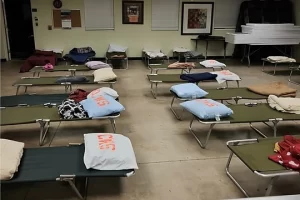
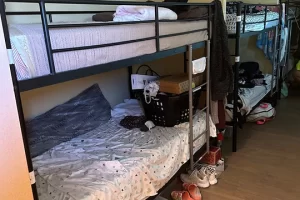

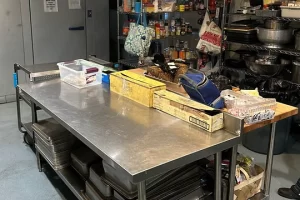
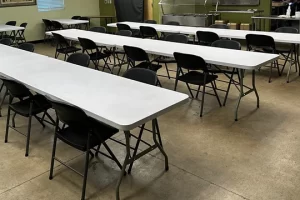
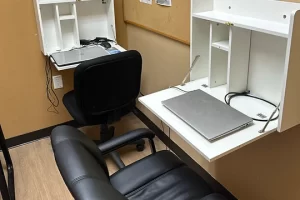
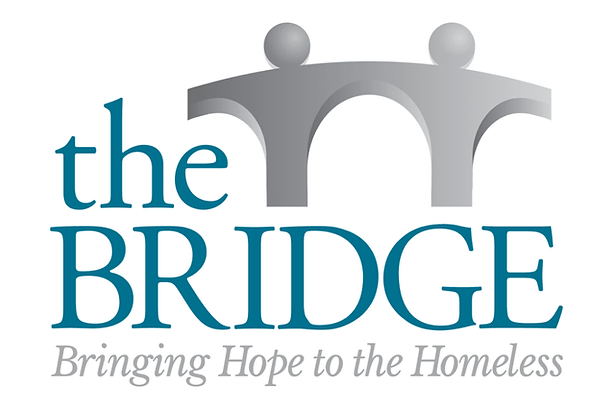
OPEN 24 HOURS
For more information, call
386-734-8120, ext. 601
